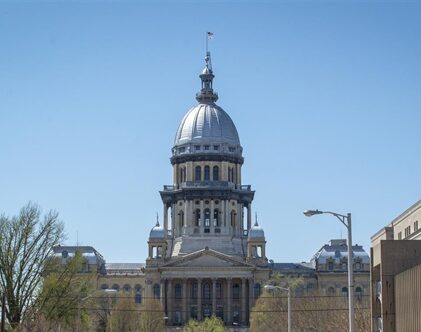State watchdog investigating employees accused of bilking federal pandemic aid program

Dozens of state employees across multiple agencies are under investigation by a state watchdog for claims they fraudulently obtained payments from a federal pandemic-era loan program, Capitol News Illinois has learned.
Neil Olson, general counsel at the Illinois Office of the Executive Inspector General, confirmed that “OEIG has been investigating allegations of Paycheck Protection Program fraud by state employees under our jurisdiction.” The review, he said, is “systematic,” involving multiple state agencies and the other governing bodies under OEIG’s jurisdiction, which include state universities, boards and commissions, and regional transit boards.
Congress intended for the loans issued by the U.S. Small Business Administration, most of which were later forgiven, to keep small businesses afloat and their employees on the payroll as COVID-19 resulted in lockdowns and interrupted commerce.
Fraud in the PPP program has been widespread across the United States. In a June report, the inspector general for the SBA estimated that the agency paid out more than $200 billion in “potentially fraudulent” aid during the pandemic – about 17 percent of the $1.2 trillion that was dispersed through the PPP and other similar programs.
In the rush to swiftly disburse funds, the federal agency “weakened or removed the controls necessary to prevent fraudsters from easily gaining access to these programs,” the report stated. “The allure of ‘easy money’ in this pay and chase environment attracted an overwhelming number of fraudsters to the programs.”
The OEIG typically does not comment on ongoing investigations, and Olson declined to say how many employees could face disciplinary action – up to and including termination – as a result of the widespread probe or provide any additional details.
The scandal has ensnared numerous employees who work at the Illinois Department of Human Services, including at state-run facilities for people with disabilities that are facing staffing shortages. In late June, a spokesperson for the agency confirmed that at least 30 IDHS employees were in various stages of the disciplinary process for inappropriately taking PPP loans. At the time, eight IDHS employees had been fired, six had resigned and 16 were pending disciplinary action.
In a statement, the agency said that it is “committed to safeguarding the public” and takes the outcomes of the OEIG’s investigations seriously.
“Falsifying a federal loan document, for significant and improper personal gain, calls into question one’s character, honesty, and ability to act ethically,” the statement read. “While the vast majority of IDHS’ roughly 14,000 state employees are hard-working people of strong character who work tirelessly to help the most vulnerable, it is deeply concerning any time an employee takes advantage of public programs.”
The agency said it will continue to work to detect and punish fraud committed by its workers, in cooperation with the OEIG, law enforcement and federal authorities.
The fraud was not limited to IDHS. Collectively, state employees may have obtained millions of dollars in fraudulent payments. A spokesperson for Gov. JB Pritzker declined to provide specifics about how many employees have faced disciplinary action for PPP fraud, saying that the governor’s office does not comment on ongoing investigations. While some employees have already received notices of their termination, they have a right to appeal that decision.
Not every state employee who claimed a PPP loan committed fraud. Some may have had legitimate outside employment that made them eligible for the federal loan program. Those individuals would not be disciplined.
State policies require employees to disclose secondary income, and certain state employees, such as agency managers and people who are responsible for procurement and other financial dealings, must also file statements of economic interest with the secretary of state’s office that would detail outside income. The investigations may center around whether they filed fraudulent paperwork to obtain the loan, thereby acting in a way unbecoming of a state employee, or failed to follow ethical guidelines disclosing such income – or both.
The OEIG is not a criminal law enforcement authority. In general, it investigates state employees for breaches of ethics and other misconduct and makes recommendations that could range from retraining to termination, depending on the seriousness of the offense. If conduct is criminal in nature, OEIG has the authority to share its findings with law enforcement.
Other public sector employees in Illinois have also come under scrutiny for PPP fraud. Numerous Cook County government workers have been terminated or resigned for bilking the program of hundreds of thousands of dollars over the past year.
Capitol News Illinois is a nonprofit, nonpartisan news service covering state government. It is distributed to hundreds of print and broadcast outlets statewide. It is funded primarily by the Illinois Press Foundation and the Robert R. McCormick Foundation, along with major contributions from the Illinois Broadcasters Foundation and Southern Illinois Editorial Association.
Miss Clipping Out Stories to Save for Later?
Click the Purchase Story button below to order a print of this story. We will print it for you on matte photo paper to keep forever.

